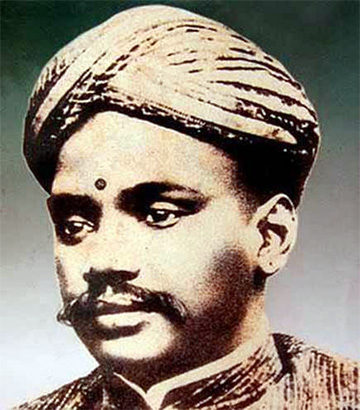V. O. Chidambaram Pillai | 07 Sep 2021
Why in News
Recently, the Prime Minister paid tribute to V. O. Chidambaram Pillai, the legendary freedom fighter on his 150th birth anniversary.
- He was popularly known as Kappalottiya Tamilan (The Tamil Helmsman) and Sekkizuththa Semmal (scholarly gentry who suffered at the oil press).
Key Points
- Birth:
- Vallinayagam Olaganathan Chidambaram Pillai (VOC) was born 5th September 1872 to an eminent lawyer Olaganathan Pillai and Paramyee Ammai in Ottapidaram, Tirunelveli district of Tamil Nadu.
- Early Life:
- VOC graduated from Caldwell College, Tuticorin. Before beginning his law studies, he worked for a brief period as the taluk office clerk.
- His tussle with the judge forced him to seek fresh pastures at Tuticorin in 1900.
- Until 1905, professional and journalistic activities consumed most of his energy.
- Entry in Politics:
- VOC entered politics in 1905 following the partition of Bengal.
- Towards the end of 1905, VOC visited Madras and was drawn closer to the Swadeshi Movement initiated by Bal Gangadhar Tilak and Lala Lajpat Rai.
- VOC was drawn towards Ramakrishna Mission and came into contact with Subramania Bharati and the Mandayam family.
- It was not until the arrival of VOC at Tuticorin (Present day Thoothukudi) that the Swadeshi movement in Tirunelveli district began to gather force and momentum.
- VOC entered politics in 1905 following the partition of Bengal.
- Role Played in Freedom Movement:
- By 1906, VOC won the support of merchants and industrialists in Tuticorin and Tirunelveli for the idea of establishing a Swadeshi merchant shipping outfit by the name of the Swadeshi Steam Navigation Company (SSNCo).
- He established many institutions like Swadeshi Prachar Sabha, Dharmasanga Nesavu Salai, National Godown, Madras Agro-Industrial Society Ltd and Desabimana Sangam.
- VOC and Siva were aided in their efforts by a number of Tirunelveli-based lawyers, who formed an organisation called the Swadeshi Sangam, or ‘National Volunteers’.
- The nationalist movement acquired a secondary character with the beginning of the Tuticorin Coral Mills strike (1908).
- Even prior to Gandhiji’s Champaran Satyagraha (1917), VOC took up the cause of the working class in Tamil Nadu, and thus he is a forerunner to Gandhiji in this respect.
- VOC, along with other leaders, resolved to take out a mammoth procession on the morning of 9th March 1908 to celebrate the release of Bipin Chandra Pal from jail and to hoist the flag of Swaraj.
- By 1906, VOC won the support of merchants and industrialists in Tuticorin and Tirunelveli for the idea of establishing a Swadeshi merchant shipping outfit by the name of the Swadeshi Steam Navigation Company (SSNCo).
- Writings: Meyyaram (1914), Meyyarivu (1915), Anthology (1915), Thirukural with literary notes of Manakudavar (1917), Tholkappiam with literary notes of Ilampooranar (1928), Autobiography (1946).
- Death: V.O.C died on 18th November 1936 in the Indian National Congress Office at Tuticorin as was his last wish.

